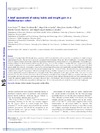Identificador persistente para citar o vincular este elemento:
https://accedacris.ulpgc.es/handle/10553/24248
| Título: | A brief assessment of eating habits and weight gain in a Mediterranean cohort | Autores/as: | Zazpe, I. Bes-Rastrollo, Maira Ruiz-Canela, Miguel Sánchez-Villegas, Almudena Serrano-Martínez, M. Martínez-González, Miguel Ángel |
Clasificación UNESCO: | 3206 Ciencias de la nutrición 32 Ciencias médicas |
Palabras clave: | Obesity Cohort studies Prospective studies FFQ |
Fecha de publicación: | 2011 | Proyectos: | Red Alimentación Saludable en la Prevención Primaria de Enfermedades Crónicas: la Red Predimed. (Retics 2006) | Publicación seriada: | British Journal of Nutrition | Resumen: | Assessment of eating habits (EH) through closed questions could be an alternative tool to assess diet as a predictor of weight change in epidemiological studies. The aim was to assess the association between baseline EH and the risk of weight gain or becoming overweight/obese in a Spanish dynamic prospective cohort (the Seguimiento Universidad de Navarra Project) of 10 509 participants. The baseline questionnaire included ten short questions with two possible answers: yes or no. We calculated a baseline EH score, categorised in quartiles, positively weighting answers on more fruit, vegetables, fish and fibre and less meat, sweets and pastries, fat, butter, fatty meats and added sugar in drinks. Reducing the consumption of meat or fat and removing fat from meat were significantly associated with lower weight gain. The partial correlation coefficient between EH score and weight change was - 0·033 (P = 0·001). We observed 1063 cases of incident overweight/obesity among 7217 participants without overweight/obesity at baseline. Trying to eat more fruit, fish or fibre and less meat was inversely significantly associated with incident overweight/obesity. Those participants in the upper quartile of the score were at a 38 % (adjusted OR 0·62; 95 % CI 0·48, 0·81) lower risk of developing overweight/obesity during the follow-up compared with those in the lower quartile. However, the receiver-operating characteristic curves for the model with and without the EH score were materially identical. Despite the apparent significant inverse association, this score had a low predictive value for future weight gain and for incident overweight/obesity in a Mediterranean population, although some EH were independently and positively associated with weight gain. | URI: | https://accedacris.ulpgc.es/handle/10553/24248 | ISSN: | 0007-1145 | DOI: | 10.1017/S0007114510004149 | Fuente: | British Journal of Nutrition [ISSN 0007-1145], v. 105 (5), p. 765-775 | Derechos: | by-nc-nd |
| Colección: | Artículos |
Citas SCOPUSTM
16
actualizado el 08-jun-2025
Citas de WEB OF SCIENCETM
Citations
15
actualizado el 08-jun-2025
Visitas
118
actualizado el 28-dic-2024
Descargas
168
actualizado el 28-dic-2024
Google ScholarTM
Verifica
Altmetric
Comparte
Exporta metadatos
Los elementos en ULPGC accedaCRIS están protegidos por derechos de autor con todos los derechos reservados, a menos que se indique lo contrario.
